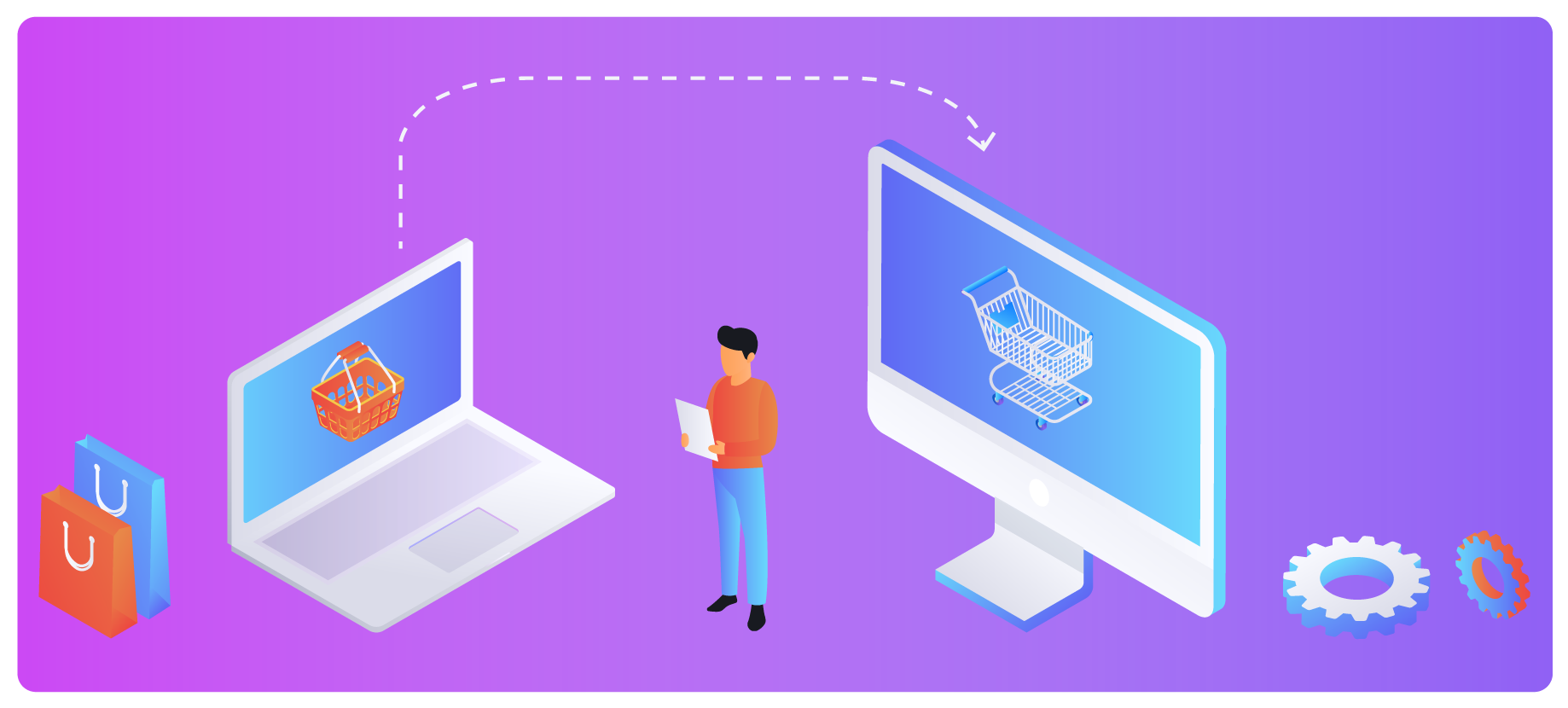Ecommerce Replatforming: Streamline Your Online Store & Boost Sales
In today’s competitive e-commerce landscape, having a robust and scalable online store is no longer a luxury – it’s a necessity. But what happens when your current e-commerce platform starts to feel like a limiting factor? Enter ecommerce replatforming, a strategic move that involves migrating your entire online store to a new platform.
This guide delves into everything you need to know about e-commerce replatforming, from identifying the signs it’s time to move on to the benefits of choosing a new platform and the steps involved in a successful migration.
When to Consider Ecommerce Replatforming
While a growing business is a positive problem to have, it can sometimes expose limitations in your current ecommerce platform. Don’t rush into a complete overhaul, but be aware of the telltale signs that your platform might be hindering your online success. Here’s when you should consider ecommerce replatforming:
Limitations of Your Current Platform:
- Feature Shortcomings: Does your platform lack the features and functionalities you need to effectively manage your products and marketing campaigns? For instance, are you struggling to implement targeted promotions or personalize the customer journey? A modern platform can offer features like product information management (PIM) systems for streamlined product data handling and robust marketing automation tools to optimize your reach.
- Scalability Struggles: Is your platform outdated and struggling to handle increasing traffic volumes or data complexity? As your business grows, you’ll experience more website visitors and potentially larger product catalogs. An outdated platform might slow down during peak seasons or struggle to handle complex product information, leading to frustrated customers and lost sales.
- Security Worries: Are security concerns keeping you up at night? Robust security features are paramount in today’s e-commerce landscape. An outdated platform might have vulnerabilities that expose customer data and financial information. A modern platform with advanced security measures can provide peace of mind and build trust with your customers.
Business Growth and Changing Needs:
- Sales on the Rise: As your business scales and experiences increasing sales volume, your e-commerce platform needs to keep pace. A platform that functioned well for a smaller store might not be able to handle the demands of a growing business.
- Product Expansion: Are you expanding your product range or venturing into new categories? Your current platform might not be able to accommodate the additional complexity of managing a wider variety of products.
- Integration Woes: As your business grows, you’ll likely integrate with new business systems like CRM or ERP software. If your current platform struggles to integrate with these systems, it can create data silos and hinder operational efficiency.
If you’re experiencing any of these signs, it might be time to consider e-commerce replatforming. By moving to a more robust and scalable platform, you can unlock new growth opportunities, streamline operations, and provide a superior customer experience that drives sales and builds brand loyalty.
Benefits of Ecommerce Replatforming
Taking the leap to replatform your e-commerce store can seem daunting, but the potential rewards are significant. A modern platform can be the engine that fuels your online business growth, offering a multitude of benefits:
1. Unleash Powerful Functionality:
Gone are the days of limited features. Modern e-commerce platforms are packed with tools to streamline your operations and enhance customer experience. Here are some highlights:
- Product Information Management (PIM): Manage complex product data with ease. PIM systems ensure consistency and accuracy across all your channels, saving you time and resources.
- Robust Marketing Tools: Craft targeted campaigns, automate email marketing flows, and personalize the customer journey. Modern platforms empower you to reach the right audience with the right message at the right time.
- Seamless Mobile Shopping: Today’s consumers demand a smooth mobile experience. A new platform can ensure your website is responsive and user-friendly across all devices, maximizing conversions on the go.
2. Scale with Confidence:
As your business grows, your platform should too. Here’s where modern platforms shine:
- Effortless Scalability: Handle increasing traffic volumes and data complexity with ease. A robust platform can accommodate your growth without compromising performance, ensuring your website stays fast and responsive even during peak seasons.
- Improved Performance: Faster loading times and a smooth overall shopping experience are crucial for customer satisfaction and conversion rates. A modern platform can deliver the speed and performance your customers expect.
3. Fortify Your Security:
Protecting customer data is paramount. Here’s how a new platform can bolster your security posture:
- Advanced Security Measures: Modern platforms offer robust security features to safeguard customer data and transactions. This gives you peace of mind and builds trust with your customers.
- Reliable Uptime: Ensure your online store is always open for business. Reliable uptime and a proven track record of security are essential for a seamless customer experience.
4. Streamline Operations and Save:
Modern platforms can be your secret weapon for operational efficiency:
- Automated Tasks: Free up your team’s time with features like automated order fulfillment or inventory management. This allows them to focus on higher-value tasks.
- Seamless Integrations: Connect your e-commerce store with your existing CRM, ERP, or other business systems. This eliminates data silos and streamlines your workflows, potentially leading to cost savings.
- Reduced Maintenance Needs: Modern platforms often require less ongoing maintenance compared to outdated systems. This translates to lower IT costs and allows you to focus on core business activities.
5. Elevate the Customer Experience:
A happy customer is a loyal customer. Here’s how a modern platform can help:
- User-Friendly Navigation: Clear navigation and intuitive product search functions make it easy for customers to find what they’re looking for, leading to a more positive shopping experience.
- Personalized Recommendations: Leverage features like wishlists or personalized product recommendations to create a more engaging shopping experience that encourages repeat business.
By investing in ecommerce replatforming, you can unlock a wealth of benefits that propel your online business forward.
The Ecommerce Replatforming Process
Replatforming your e-commerce store can be a transformative experience, but it requires careful planning and execution. Here’s a breakdown of the key steps involved:
1. Charting Your Course: Planning and Evaluation
Before diving in, take a moment to map out your destination. Here’s what you need to consider:
- Defining Your Goals: What are your aspirations for your online store? Increased sales? Improved customer experience? Streamlined operations? Clearly define your goals to guide your platform selection.
- Needs Assessment: Identify the functionalities crucial for your business. Do you need advanced marketing automation features? Robust inventory management tools? Understanding your specific needs will help you choose a platform that’s the right fit.
- Future-Proofing: Consider your future growth projections. Will your chosen platform be able to scale with your business? Think ahead to avoid another replatforming exercise down the line.
2. Evaluating Your Options:
With a clear roadmap in hand, it’s time to explore your options. Here’s what to look for in a potential e-commerce platform:
- Feature Sets: Does the platform offer the functionalities you need today and anticipate needing in the future?
- Scalability: Can the platform handle increasing traffic volumes and data complexity as your business grows?
- Pricing Models: Consider the pricing structure and ensure it aligns with your budget.
- Ease of Use: A user-friendly platform is essential for both your team and your customers.
4. Data Migration: The Bridge to Your New Home
Migrating your data to the new platform is a crucial step. Here’s how to ensure a smooth transition:
- Partner with Experience: Choose a replatforming partner with a proven track record of data migration. This minimizes the risk of data loss and ensures a seamless transition.
- Data Integrity is Key: Verify that all your product data, customer information, and order history are accurately migrated to the new platform.
- Integration Matters: Seamless integration with your existing CRM, ERP, or other business systems is essential for maintaining efficient operations after the migration.
5. Testing and Launch: A Smooth Takeoff
Before opening the doors to your new online store, ensure everything is in tip-top shape:
- Rigorous Testing: Perform extensive testing on the new platform to identify and address any bugs or functionality issues.
- Launch Strategy: Develop a well-planned launch strategy to minimize disruption to your customer experience. Consider factors like data cutover timing and potential communication needs with your customers.
By following these steps and partnering with a skilled replatforming team, you can navigate the e-commerce replatforming process with confidence and unlock the full potential of your online store.
Choosing the Right E-commerce Replatforming Partner
The decision to replatform your e-commerce store is a significant one. Choosing the right partner can make all the difference between a smooth and successful transition and a frustrating, disruptive experience. Here’s what to look for in a replatforming partner:
Experience is the Best Teacher:
- Platform Expertise: Look for a partner with proven experience migrating stores to your chosen platform. They should have a deep understanding of the platform’s functionalities, potential pitfalls, and best practices.
- Migration Track Record: Ask about the partner’s previous experience with similar projects. A history of successful migrations in your industry is a strong indicator of their capabilities.
- Strategic Guidance: A good partner goes beyond simply executing the migration. They should be able to provide strategic guidance throughout the process, helping you define your goals, choose the right features, and develop a successful launch strategy.
Beyond the Migration: Ongoing Support is Crucial
- Development Skills: Your business may have unique needs that require custom functionalities or integrations. Choose a partner with the development skills to handle these customizations, ensuring your new platform perfectly aligns with your business goals.
- Post-Launch Care: Replatforming doesn’t end with the launch. Ongoing maintenance and support are essential for keeping your platform running smoothly and addressing any issues that may arise. Look for a partner who offers comprehensive post-launch support packages.
Conclusion
Ecommerce replatforming can be a game-changer for your online business, but navigating the process requires careful planning and a skilled partner by your side. OnextDigital offers a comprehensive suite of services designed to empower you throughout your replatforming journey: Web Development Service, Mobile App Development Service, UX/UI Design Service, and CRM & Auto Marketing Implementation Service.
Don’t settle for a one-size-fits-all solution. OnextDigital offers the customized services you need to achieve your unique e-commerce goals. Contact us today for a free consultation and unlock the full potential of your online store!








